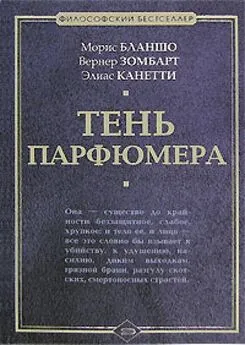Вернер Зомбарт - Буржуа
- Название:Буржуа
- Автор:
- Жанр:
- Издательство:Наука
- Год:1994
- Город:Москва
- ISBN:5-02-013444-9
- Рейтинг:
- Избранное:Добавить в избранное
-
Отзывы:
-
Ваша оценка:
Вернер Зомбарт - Буржуа краткое содержание
Как создался дух нашего времени и в каких формах он ныне проявляется, — вот что пытается описать настоящая книга, путем изложения генезиса носителя этого духа и его представителя — буржуа. Для того чтобы представления читателя никогда не терялись в царстве теней абстракции, но, напротив, были всегда полны созерцаний живой жизни, я поставил в центр моего исследования самого человека и выбрал то заглавие, которое эта книга носит. Однако лишь духовная сторона человеческой разновидности — буржуа — будет нас занимать, а не его общественные отношения: это выражено в подзаголовке: «Этюды по истории духовного развития современного экономического человека».
http://fb2.traumlibrary.net
Буржуа - читать онлайн бесплатно полную версию (весь текст целиком)
Интервал:
Закладка:
301. «Patet quod abusum divitiarum et paupertatis fugiendum docet, non ipaas divi-tias et paupertatem». Opusc. contra impugnantes relig. rionci. 3 цитировано у llgner Ant. т. Fl. 151.
302. «In tantum divitae sunt bonae in quantum perficiunt ad usum virtutis Paupertas non in se est bona, sed in quantum liberal ab illis, quibus impeditur homo, quorninus spiri-tualibus bonis intrudat» (Ant. S. mor. IV. 12. 3). 303. «a. Domino Deo est haec varia divitiarum et inaequalis dispensatio» (Ibid. mor. II I II. L).
304. «Богатому бог хотел» benignitatis suae experimenta conferre; со ссылкой на H. Ambrosius: Ibid. mor. II. I II. § 1, или он хотел дать ему возможность fidelis onis его nipeiabundantia: Anf. S. mor. dispensationis 7, 3, § 2. Богатство должно употребляться ad finern «quern Durs intendit. ut scilicet recognoscat ipsurn ut benefactorem et diligat et pro nomine eius indigentibus largiatur» (Ant. S. mor. II. 1. II. 1).
305. Ant. S. тот. II. 1. II. 1.
306. Это важное место гласит в целом: «Singulares autem personas multas ab intrin-icco donates conspicimus quadam sapientia… ita quod Inter homines vel aliorurn domini mati nei facti sint quamvis domini non sint. Et quia his naturali aequitate debetur regimen aliorum, idcirco si isti appetunt dominium si adhoc cumulant pecunias ut dominium temporale emant, ut quiucque decet sapientiam, a rationis rectae tramite non recedunt». Это следовательно, «qui cumulant pecuniam ut habeant superiorem statem consonum uae virtuti: mensuratur quippe horum appetitus ascendendi penes quantitatem suae virtutil» (Comm. Card. Cajet. ad S. Thorn. S. th. lla, Пае qu. 118 a. 1).
307. «Si quis sufficienter dives pro naturali felicitate consequenda, ex solo appetitu a cendendi et gloriae, cumulat pecunias praesenti suae conditioni superfluas, procul dubio Immoderato fertur amorae: sicut illi qui solo amore lucri negotiantur. Utriusque nam appetitui sine fine est: quoniam tarn ascendere quam lucrari, absolute, sumpta, termino carent» (Caiet I.e.). «…si finam ponat ultimum in lucre, intendens solum divitias augere in immensum et sibi reservare, in statu permanent damnations» (Ant. S. mor. II. 1. 16, 2).
308. Bernh. ч. Siena, 3, 311. И к нему «Unternehmung und Mehrwert», 35, 78.
309. «…dicendum quod ille qui mutuat pecuniam transfert dominium pecuniae in cum cui mutuat. Unde ille cui pecunia mutuatur sub suo periculo tene earn, et tenetur intagre restituere. Unde non debet amplius exigere ille qui mutuavit. Sed ille qui sommittit pecuniam suam те1 mercatori те1 artifici per modum societatis cuiusdam, non transfer dominium pecuniae suae ni ilium, sed remanet eius, eta quod cum periculo ipsius mercator de ea negoriatus vel artifix operatur. Et ideo licite potest partem lucri inde proTinientis expe-tare, tanquam de re sua» (5. Thorn. S. th. lla, II ae, qu. 78. a. 2.
310. «Et tu dicunt libentius Tenderent ta'es pannos tali pretio sc. 45 те1 46 ad contan-toi, si omnes et majorem partem sic possent Tendere quam per 50 ad terminum, quod pecuniam tune habitam cito reinTertirent (.) pluries in anno pannos faciendo» (Ant. S. mor. III. 8, 4, 2).
311. «Si (pecunia est tradita) per modum capitalis, seu rectae societatis, tuno in pacto Miet, quo deberet earn solis mercatoribus fidelitur deputare. Et haec ultima ratio Tidetur fortiter probare, quo non sit tradita dicta pecunia, nisi ut mutui rationern habens in quod spes lucri reprobatui….» (Ant. S. mor. II. 1. 6. 16).«…potius Tult uti, ut usurario mutuo nuam in mercationibus, ut in того capitali…» (Ibid. 15). Ср. Bernh. Sien Sermo XLII c. II: «mutuum usurarium — ratione capitalis».
312. «illud quod in firmo proposito Domini sui est ordinatum ad aliquod prohabile, non solum habet rationern simplicis pecunia, sine rei sed etiam ultra hoc quamdam senina-lem rationern lucrosi, quam communiter capitale Tocamus. Ideo non solum Teddi habet simpler valor ipsius, sed etiam valor super adjunctus». (Bernh. Sien. Sermo, XXXIV, c. III).
313. Ant. S. mor. II. 1, 5, 37.
314. Ant. S. mor. II, 46.
315. Ant. S. mor. II. 37.
316. «…quia pecunia eius habet rationem capitalis, potest ex ea ratione suae capitali. tatis exigere» (S. mor. II, I, c. VI, 15). «Ut magis possent cum ilia pecunia lucrari…» (Ibid. 29). «quia iste sua pecunia jam habet rationi capitales, potes ex ea ratione sui capj. talitatis exigere in praetato casu» (Bern.Sien. Sermo XLII, c. II. Opp. 2, 252). «Adver-tendum quod, si creditor ex ilia pecunia nihil fecisset, nec facturus fuisse supponitur unde lucrum aliquod consequi posset, utpote, quia pro certo supponitur quod earn simpli. citer expendisset seu in area servasset, turn ad nullum interesse lucri obligatus est.» (Ibid. C. III).
317. «…tenetur talia lucra sic percepta restituere, noun. obstante quod depositarii mul-tum cum ipsa lucri faerint, nam lucrum industriae fuit, non pecuniae, et periculo sub-stabat amissionis cuius, deponens nolebat esse particeps» (Ant. t. II, T. 1. c. V. 34).
318. «Quaritur an dans pecuniam mecratori ad mercandum vel artific ad materias emen-dum, et ex eis artificiata faciendum cum pacto, vel etiam sine pacto, sed cum hac inten-tione principali, quod capitale sit salvum, et partem lucri habeat: num quid talis est usura-rius?»
Да, потому что устранен риск (Ant. S.th. II. 1, 5, 37).
319. «si periculum capitalis spectaret ad utrumque, tune cum societas contrahatur per talia verba, tune bene est licitus, licitust est enim, quod unus socius ponat pecuniam et alius operam et sic suppleat labore, quod deest in pecunia» (L.c.).
320. «pecunia est se sola minime est lucrosa nec valet seipsum multiplicare; sed er indu-stria mercatium fit per eorum mercationis lucrosa» (Ant. S. mor. II. 1, 6, 16). «Sillam pecuniam mutuatam in licitis negotiis lucrum illud adtribui debet et deputari industriae suae et labori, cum etiam substaret periculis» (ed. 1, 36).«…in recompensationern laboris industriae et expensarum» (1. c. II. 16).
Особенную заслугу работы Келлера составляет то, что он направил внимание на понятие «industria» У схоластиков.
321. «…sunt nobiles qui nolunt laborare; et ne pecuina eis deficiat paulatim consumen-do, tradunt earn mercatori vel trapezitae, intendentes principalier aliquid annuantim reci-pere ad discretionern corum salvo tamen capitali: tamen dare usura est».
322. «Per avaritiam enim tollit sibi operositalem omnis debiti modi procurandi sibi lici-ta et salubria lucra et pro tanto efficitur desidiosus, acidiosus, otiosus. Ex hoc etiam avari-tia necessitat hominern ad indebitos modos lucrandi contra legem» (Ant. S. mor. II. 1,2,6).
323. Я приведу здесь соответствующие места на английском языке, в том же порядке, в каком я их в извлечениях привел в тексте: «Now little do the wealth and honours of the world concern a soul than is going into another world, and knows not but it may be this night. Then keep the wealth or take it with thee, if thou canst» (Baxter. Christ Dir. (1670), 218). «Labour to feel they greates wants, which wordly wealth will not supply» (Ibid.). «Thou art dead in sin and polluted and captivated by the flesh and money will sooner encrease the bondage than deriver thee» (Ibid.). «Will honest poverty or over — loved wealth be sweater at last?» (Ibid.). «Remember tha Riches do make it much harder for a man to be saved» (Ibid.).
Цит. Сократа; Socrates dixits, opes et nobil tates non solum nihil in se habere honesta-tis, verum et omne malum ex eis oboriri. «Petrarca. Dial. 44, 2. nullius rei eget qui virtu-turn dives est.: quarum indigentia vere miseros… faciy» (Cicero., Cao major: maxime vitu-peranda est avaritia senilis. Сократ in Laert: deis maximo propinquus qui minimus egeat. 1. c., 1. 217. 1. Tim. 6, 10: the Love of monye is the root of all evil. Do you believe that here lyeth the danger of your souls? and yet can you so love and choose and seek it)-«World liness makes the Word unprofitable and keepeth men from believing and repetine and coming to God and minding seriously the everlasting world».
What so much hindereth the Conversion of sinners, as the love and cares of earthly things? They cannot serve God and Mammon (1. 220). «In a word as you heard, the love of money is the root of all evils, and the love of the Father is not in the lovers of the world» (ibid.). «Remember that riches are not part of your felicity. Less, remember that riches are not the smallest temptation and danger to your Souls. It is not for nothing that Christ giveth so many terrible warnings about Riches and so desoribeth the folly, the danger and misery of the worlds rich… and teleht you how hardly the rich are saved» (Ch. XXVIII, II).
324. «…he that is greedy of gain, troubleth his own house, but he that hateth gain, shall live. Do you know that a godly man contendet with his daily bread hath a far sweeter and quieter life and death than a self-troubling wordling?» (Baxter Christian Directory 1, 219). Христос был нищим. — «In Christ did scrape and care for Riches, then so do thou: in he thought it the happiest life, do thou think so too. But if he contemmed it do thou contemnit». (Ibid.). «If you had believed that the gain of holy wisdom had been so much better than the gaining of Gold, as Solomon saith. Prov. 3, 14, you would have laind out much of that time in labouring to understand the scriptures and preparing for your endless life». «Piercing sorrows here and damnation hereafter are a very dear price to give for money» (Ibid.) «…take heed lest the success and prosperity of your affairs do too much please you, as him: Luc. 12.20». Baxter (Christ. Directory 1, 229).
325. «When men are not content with food and payment, but would still heap up more, it is just with God go leave them not so much bread: and to suffer men to have an evil eye upon them and to pluck at them, even so long as they have meat». Hutcheson, Exposition of the book of Job. p. 296. «Ye may seek more, if he will be rich, and will have superfluities then ye shall fall into many temptations, snares and hurtful lusts which shall drown you in perdition…» (Binning, Sermons, 3, 359).
Buckle, Gesch. der Civ. 2^, 388. «And certainly to crave and be desirous of more than what is competent for the main tenance and support of our lives, is both inconsistent with the dependence and subjection we owe to God, and do h also bespeak a great deal of vanity, folly and inconsiderateness.». Cockburns. Jacobs Now or Man's Felicity and Duty. «Why would man rack their heads with cares how to provide for to-morrow, while they know not if they shall thou need anything?» (Bostons, Human Nature in its Four-fold State, p. 300).
326. «Men are loth to lend their care to the World, when they abound in prosperity». Abernethy, Physike for the Soule, p. 448, Buckle, 387. «Such is the weakness even of godly mens that they can hardly live in a prospeous condition and not be overtaken with some security, carnal confidence, or other miscarriage» (Hutcheson. Exposition of the Book of Job. P. 387).
327. Baxter, Christ Dir. 1, 237, 245.
328. Burnest. Hist. of its own time 1, 108; ср.: Buckle, a.a.0; Mackintosh. Hist. of Civil. in Scotland, 3,269.
Читать дальшеИнтервал:
Закладка:









